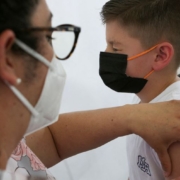Pfizer Inc. and the company’s partner BioNTech SE said on April 26 that they had submitted an application to the U.S. health regulator for the authorization of a booster dose of their COVID-19 vaccine for children aged 5 to 11 years.
AstraZeneca’s Phase III Provent trial results showed a statistically significant 77 percent decrease in a patient’s likelihood of developing symptomatic COVID-19 when proactively treated with Evusheld. Additionally, results were announced by Clover Biopharmaceuticals for the Phase II/III Spectra global study investigating the efficacy of the SCB-2019 (CpG 1018/Alum) vaccine booster in patients that have previously developed a COVID-19 infection.
Moderna to file for EUA of COVID-19 shot for very young kids by April end
Clinical Trials, Coronavirus Disease (COVID-19) Pandemic, Coronavirus Disease 2019 (COVID-19), Coronavirus Disease 2019 (COVID-19), Coronavirus Vaccines, COVID-19 shots, COVID-19 Vaccine Guidance, COVID-19 Vaccines, Emergency Use Authorization (EUA), FDA, Kids, Moderna, mRNA-1273/Moderna COVID-19 Vaccine (Moderna), Omicron (B.1.1.529) (South Africa), R&D, TherapeuticsModerna plans to submit an application to the U.S. health regulator for emergency use authorization (EUA) of the company’s COVID-19 vaccine among kids between the ages of six months to five years by the end of the month, a company spokesperson said.
Arcturus Therapeutics announced positive Phase III trial results for the company’s mRNA vaccine candidate ARCT-154, which is intended to prevent COVID-19 caused by the SARS-CoV-2 virus.
Moderna Inc. on April 19 said a COVID-19 booster designed to target the Beta variant as well as the original coronavirus generated a better immune response against a number of virus variants including Omicron.
Fourth shot protects against severe Omicron outcomes; COVID may increase risk of rare eye blood clots
Blood Clots, Blood Vessels, BNT162b2 (Pfizer and BioNTech), Breakthrough COVID-19, COVID-19 booster shots, COVID-19 Infections, COVID-19 shots, COVID-19 Studies, COVID-19 Vaccines, Eye Conditions, Hospitalized COVID-19 Patients, Israel, New England Journal of Medicine, Omicron (B.1.1.529) (South Africa), SARS-CoV-2 virusA fourth dose of the COVID-19 vaccine from Pfizer and BioNTech provided significant added protection against severe disease, hospitalization and death for at least a month in older individuals, according to a study from Israel conducted when the Omicron variant was dominant. Additionally, new findings suggest patients with COVID-19 may have an increased risk of rare vision-threatening blood clots in the eye for months afterward.
Pfizer/BioNTech say booster dose increases protection against Omicron in kids aged 5-11
BNT162b2 (Pfizer and BioNTech), CDC, Children 5-11 Years, Clinical Trials, COVID-19 booster shots, COVID-19 shots, COVID-19 Vaccines, FDA, Immunocompromised, Immunogenicity Data, Neutralizing Antibodies, Omicron (B.1.1.529) (South Africa), R&D, SARS-CoV-2 virusA third dose of the COVID-19 vaccine from Pfizer (PFE.N) and BioNTech (22UAy.DE) produced significant protection against the Omicron variant of the coronavirus in healthy children ages 5 to 11, the companies said on April 14.
U.S. FDA aims to decide on strain selection for COVID boosters by June
BNT162b2 (Pfizer and BioNTech), Coronavirus Disease (COVID-19) Pandemic, Coronavirus Vaccines, COVID-19 booster shots, COVID-19 shots, COVID-19 Vaccine Guidance, COVID-19 Vaccines, Guidance, mRNA-1273/Moderna COVID-19 Vaccine (Moderna), Pandemics, Therapeutics, VaccinesTop U.S. Food and Drug Administration officials on April 6 said the agency is aiming to decide by June whether to change the design of COVID-19 vaccines in order to combat future variants, even if it does not have all the necessary information to measure their effectiveness.
Current COVID-19 vaccines are not well-matched against the BA.2 sub-variant of Omicron, the U.S. Food and Drug Administration said on April 6, as its panel of outside experts meets to discuss changes to future booster doses.
A fourth dose of the Pfizer/BioNTech vaccine lowered rates of COVID-19 among the elderly but the protection against infection appeared short-lived, a large study in Israel found.



 Reuters
Reuters


 Reuters
Reuters Reuters
Reuters